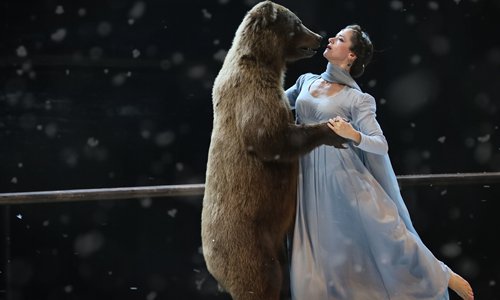HOME >> ARTS
China tour of Pushkin opera ‘Eugene Onegin’ highlights flourishing development of Sino-Russian cultural exchanges
By Chen Xi Source:Global Times Published: 2019/5/29 17:38:40

Promotional material for Eugene Onegin Photos: Courtesy of Beijing Tianqiao Performing Arts Cente
"I am in love," Tatyana Larina, dressed in a white nightdress, exclaims excitedly as she shyly buries her head under her pillow. Blow the stage, the look on the faces of the Chinese audiences seems to indicate that they too have fallen in love.
"We love Tatyana! She has a girlish purity and shyness but she is brave enough to pursue love. And she stays loyal to her husband even after Onegin comes back to pursue her. She made me understand for the first time the greatness of Russian women," Han Rui, a fan of the opera, told the Global Times.
Eugene Onegin, one of the most celebrated 19th-century Russian operas, touched many Chinese during its tour of China this month.
Traveling to Guangzhou, South China's Guangdong Province, Shanghai and Beijing, the tour was especially poignant as this year marks the 70th anniversary of the establishment of diplomatic relations between China and Russia.
Tough task
"This performance is indeed a very, very difficult task. A three-week tour in China is risky, not only in the face of various unforeseen circumstances, but also in commercial and operational risks. This tour has also set a record for our theater in the past 20 years, because we have not traveled abroad for so long," Kirill Krok, the manager of the Vakhtangov Theater in Russia, is quoted as saying in an article from Beijing Tianqiao Performing Arts Center, where the opera wrapped up its final performance on May 19.
The tour was also the largest the theater has held over the past 20 years - two large containers carrying several tons of props were shipped to China in advance, after which four large trucks were needed to transport them around the country.
"I think this tour was very successful and even surprised me because I did not expect that the Chinese audience could accept and understand our work so well," said Sergey Makovetskiy, the actor who played Eugene Onegin in his old age.
May has belonged to Eugene Onegin. More than 22,000 Chinese saw the opera, which also had over 20 trending topics about it on Sina Weibo, racking up more than 25 million views and tens of thousands of related comments.
Understood at a glance
"The most valuable part of [Alexander] Pushkin's work, Eugene Onegin, is its poeticity. This poeticity can't be completely translated into Chinese, but the adapted drama can allow the Chinese audience to feel the deep poetry of this work," said Liu Wenfei, the president of the Russian literature research association.
Undoubtedly, the huge success of the tour has much to do with its Chinese subtitles.
"Translating novels and translating subtitles are very different. It is probably similar to playing a piece of live music and doing the sound track for a movie, although it is the same melody, the production is very different," Yuan Tinglei, the subtitle translator for Eugene Onegin, told the Global Times.
The reader concentrates on the text of a book when reading, but when watching a drama, the main energy of the audience is focused on the stage, which means that subtitles can't take up too much of the audience's attention. Good drama subtitles should be able to be understood by the audience at a glance, Yuan explained.
Yuan also added that the relationship between the author, audience and actors should be taken into account when translating subtitles.
"Although the actors can't see or understand the subtitles, they can judge them by the reaction of the audience. An actor judges the quality of subtitles by noting if the response of the local audience is consistent with the response of the native-speaking audience. Therefore, the highest evaluation for me comes not from the audience, but from the director and the actors," he said.
Cross-border communication
Yuan noted he has written the Chinese subtitles for many Russian operas performing in China, including famous Russian novelist Fyodor Dostoyevsky's Demons and Masquerade by Russian Romantic writer Mikhail Lermontov. He noted that the reason why Eugene Onegin has been able to touch so many Chinese is because the universal values and the emotions it conveys can transcend national borders and different eras.
"Eugene Onegin reveals how to reread and present the classics in front of audiences in today's society. I believe Dream of the Red Chamber, one of China's Four Great Classical Novels, and The Peony Pavilion, one of China's greatest romantic tragicomedies, can achieve the same results."
In November 2017, the Chinese Opera Festival in St. Petersburg enchanted local audiences with performances, exhibitions and educational programs. The Peony Pavilion, one of the central performances, was hugely popular with audiences.
"I think such a poetic stage is similar to our Chinese opera in essence because our Chinese classical operas are also written using beautiful classical Chinese songs," Peng Tao, the head of the Department of Drama and Literature at China's Central Academy of Drama, told the Global Times.
Both China and Russia have profound cultural and artistic heritages, including brilliant literature, opera and music. The two countries are sure to continue carrying out cultural exchanges and work together on how to inject new vitality into classic works of art, Yuan noted.
Newspaper headline: Transcending time and space